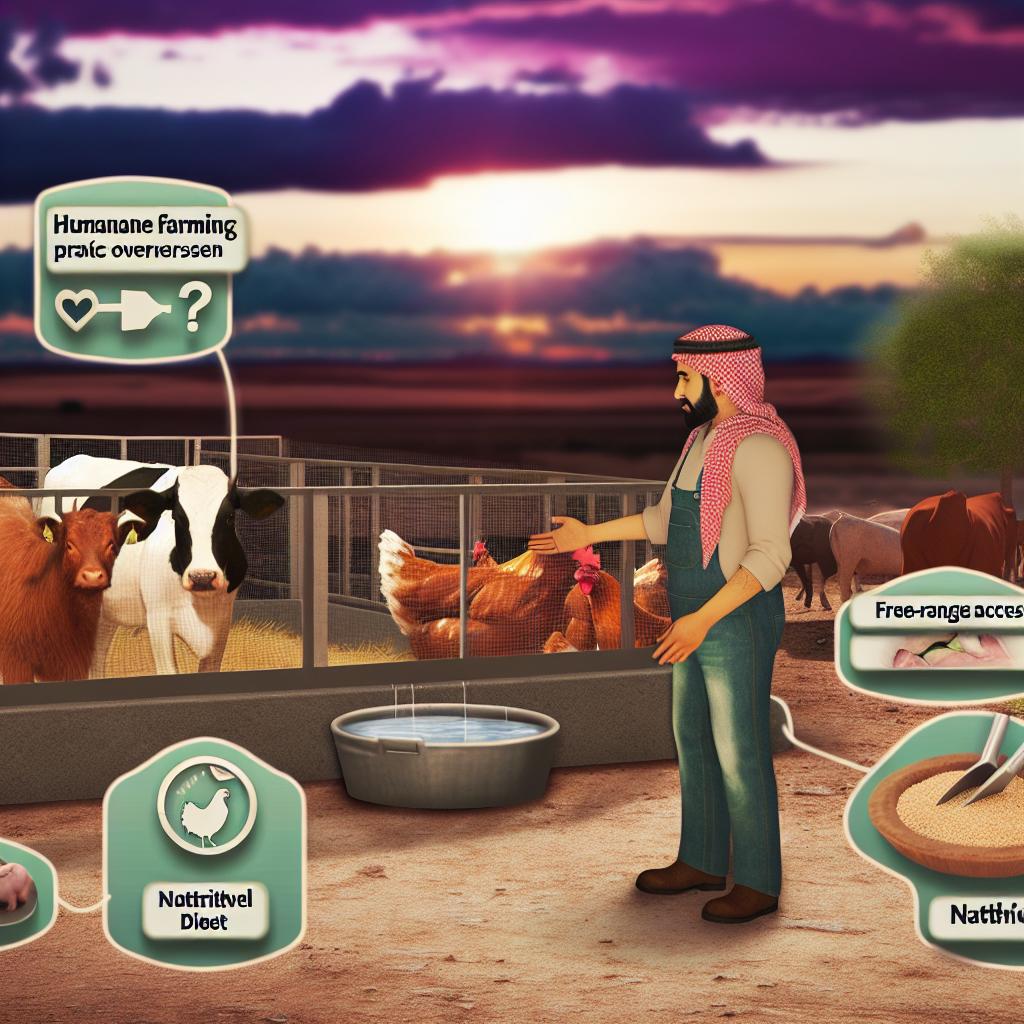Introduction to Animal Welfare and Its Importance in Livestock Farming
Animal welfare is crucial in livestock farming.
It emphasizes the well-being of farm animals.
Improving animal welfare leads to better quality products.
Additionally, it enhances environmental sustainability.
Understanding Animal Welfare
Animal welfare refers to the humane treatment of animals.
This includes ensuring their physical and emotional needs are met.
Farm animals should be able to express natural behaviors.
Moreover, they should exist in a stress-free environment.
The Role of Certifications
Certifications help consumers identify humane livestock products.
They provide assurance of high welfare standards.
Common certifications include Certified Humane and Animal Welfare Approved.
These programs promote transparency in animal farming practices.
Benefits of Prioritizing Animal Welfare
Prioritizing animal welfare yields numerous benefits.
- Healthy animals result in safer food products.
- Farmers often see improved productivity and profitability.
- Positive public perception enhances brand loyalty.
- It contributes to ethical and sustainable farming practices.
Further, safeguarding animal welfare supports biodiversity.
In turn, this action strengthens ecosystems necessary for farming.
Transform Your Agribusiness
Unlock your farm's potential with expert advice tailored to your needs. Get actionable steps that drive real results.
Get StartedOverview of Key Animal Welfare Certifications in the Industry
Importance of Animal Welfare Certifications
Animal welfare certifications promote ethical farming practices.
They help consumers identify humane livestock products.
Furthermore, these certifications improve overall animal care standards.
Common Animal Welfare Certifications
Several notable organizations provide animal welfare certifications.
Each certification has specific criteria that farms must meet.
- The Global Animal Partnership focuses on animal well-being throughout their lives.
- Certified Humane emphasizes humane treatment and good living conditions.
- Animal Welfare Approved requires farms to meet high welfare standards on pasture.
Understanding Certification Criteria
Certification criteria vary by organization.
Common elements often include access to the outdoors and natural behaviors.
Additionally, feed quality and veterinary care are crucial components.
Farmers must undergo regular evaluations to maintain their certifications.
Impact on Consumers and Industry
Animal welfare certifications influence consumer purchasing decisions.
Many consumers prioritize humane treatment when buying meat and dairy products.
Consequently, certified farms often see higher demand for their products.
Moreover, these certifications set a standard for industry practices.
The Standards and Criteria Used in Animal Welfare Certifications
Defining Animal Welfare Standards
Animal welfare standards ensure humane treatment of livestock.
They encompass physical and mental well-being.
These standards often originate from reputable organizations.
Industry stakeholders contribute to the development of these standards.
Key Criteria for Certification
Animal welfare certifications assess multiple criteria.
These criteria may include housing conditions for animals.
Access to outdoor spaces is another critical factor.
Additionally, appropriate nutrition and healthcare are essential.
Handling and transportation practices are also evaluated.
Specific Certifications and Their Requirements
Several certifications exist to guide humane livestock farming.
Each certification has its unique set of requirements.
Showcase Your Farming Business
Publish your professional farming services profile on our blog for a one-time fee of $200 and reach a dedicated audience of farmers and agribusiness owners.
Publish Your ProfileGlobal Animal Partnership (GAP)
The GAP program emphasizes progressive standards for livestock.
It includes multiple animal welfare levels.
Farmers must comply with strict guidelines to achieve certification.
Animal Welfare Approved (AWA)
A WA certification focuses on transparency and ethical farming practices.
It ensures animals meet high welfare standards throughout their lives.
Farmers must undergo annual inspections for compliance.
The Role of Audits and Inspections
Regular audits and inspections are vital for maintaining standards.
Independent auditors assess compliance with welfare criteria.
These audits often involve on-site evaluations of farming practices.
Moreover, they ensure that conditions remain consistent over time.
Benefits of Animal Welfare Certifications
These certifications provide numerous advantages to producers.
Consumers increasingly prefer products from certified farms.
Furthermore, certifications can enhance marketability and brand reputation.
They also contribute to improved animal health and productivity.
Gain More Insights: Implementing Traceability Protocols To Meet Stringent Organic Certification
Comparative Analysis of Different Animal Welfare Certification Programs
Overview of Certification Programs
Animal welfare certification programs ensure humane treatment of livestock.
These programs vary widely in their standards and practices.
Some programs focus on specific species, while others cater to various animals.
Common Certification Standards
Most certification programs share common welfare standards.
These include access to clean water and adequate food.
Additionally, animals require adequate space for natural behavior.
Healthcare access is also a critical component in these standards.
Well-Known Certification Programs
Several notable animal welfare certification programs exist today.
The Global Animal Partnership (GAP) is widely recognized for its tiered system.
This program emphasizes continuous improvement in animal welfare.
Cage-Free Certified focuses specifically on poultry welfare.
The Certified Humane program sets rigorous standards across many species.
Comparison of Program Criteria
It is important to compare programs based on their criteria.
GAP, for instance, uses five different certifications to classify farms.
Conversely, the Certified Humane program has fixed standards all farms must meet.
Moreover, the Animal Welfare Approved program prioritizes pasture-raised animals.
Consumer Impact and Awareness
Consumer awareness of these certifications is crucial.
Informed consumers can make better purchasing decisions.
This, in turn, can influence farming practices positively.
Increased demand for humane products encourages more farmers to participate.
Recommendations for Choosing a Certification
When selecting a product, consider the certification label carefully.
Research each program to understand its standards fully.
Support brands that demonstrate a commitment to animal welfare.
Your choices can help advance humane livestock farming practices.
Challenges in the Certification Process
Many challenges exist within the certification process.
Showcase Your Farming Business
Publish your professional farming services profile on our blog for a one-time fee of $200 and reach a dedicated audience of farmers and agribusiness owners.
Publish Your ProfileCosts to farmers can be a significant barrier to certification.
Additionally, varying standards can cause confusion among consumers.
Transparency in requirements is essential for improving understandability.
You Might Also Like: Sustainable Livestock Production Methods for Climate-Resilient Farming
The Role of Consumer Awareness in Promoting Animal Welfare Certifications
Understanding Consumer Demand
Consumers play a crucial role in shaping the animal agriculture industry.
Their awareness of animal welfare affects purchasing choices significantly.
Moreover, informed consumers are more likely to seek products with ethical certifications.
Importance of Awareness Campaigns
A robust awareness campaign can drive consumer interest in humane farming practices.
For example, educational programs discuss the benefits of certifications such as Certified Humane.
These campaigns create a demand for higher welfare standards in livestock production.
The Impact of Transparency
Transparency in farming practices fosters trust among consumers.
When consumers understand how animals are treated, they feel more confident in their choices.
Additionally, brands that openly share their animal welfare measures gain consumer loyalty.
Collaboration with Advocacy Groups
Collaboration between brands and animal welfare organizations is essential.
Such partnerships promote awareness and education on humane practices.
Organizations like the Humane Society International work with farmers to improve standards.
Implications of Increased Consumer Knowledge
Ultimately, consumer awareness is a powerful tool for change.
As awareness grows, so does the demand for humane certifications.
This shift can lead to improved conditions for livestock in farming practices.
Uncover the Details: Sustainable Farm Certification for Organic Crop and Livestock Production

Impact of Animal Welfare Certifications on Farm Practices and Livestock Health
Overview of Animal Welfare Certifications
Animal welfare certifications promote humane farming practices.
These certifications evaluate both animal treatment and environmental conditions.
Moreover, they set standards that farmers must adhere to achieve certification.
Influence on Farm Management Practices
Farmers often change management strategies to meet certification requirements.
These changes can lead to improved housing and feeding practices.
For instance, animals might receive better access to outdoor spaces.
This adaptation helps farmers enhance animal comfort and health.
Benefits to Livestock Health
Improved living conditions significantly benefit livestock health.
Animals experience reduced stress levels in certified environments.
Additionally, better nutrition leads to healthier livestock overall.
Farmers observe higher productivity and lower disease rates as a result.
Consumer Demand and Market Impact
There is a growing consumer demand for ethically sourced products.
Certifications help meet this demand by providing transparency.
Farmers who adopt these standards attract more customers.
Thus, certifications can lead to increased sales and enhanced farm profitability.
Challenges in Implementing Certifications
Adopting welfare certifications can pose challenges for some farmers.
Compliance often requires significant financial investment and time.
Farmers may need to alter existing infrastructure to meet standards.
Additionally, staying updated with changing regulations can be difficult.
Gain More Insights: Sustainable Farm Certification for Regenerative and Carbon Farming
Showcase Your Farming Business
Publish your professional farming services profile on our blog for a one-time fee of $200 and reach a dedicated audience of farmers and agribusiness owners.
Publish Your ProfileChallenges and Criticisms of Animal Welfare Certification Programs
Lack of Standardization
Animal welfare certification programs often lack uniform standards.
This inconsistency confuses consumers about which labels to trust.
Consequently, this leads to skepticism regarding animal welfare claims.
Insufficient Enforcement
Many animal welfare organizations face enforcement challenges.
Inspectors may lack resources to ensure compliance effectively.
As a result, some farms may not adhere to promised standards.
Misleading Marketing Practices
Some certification labels can mislead consumers.
For instance, terms like “humane” may lack clear definitions.
This ambiguity can undermine consumer choice and trust.
Economic Implications for Farmers
Animal welfare certifications can impose financial burdens on farmers.
Costs for compliance and certification can be significant.
Consequently, some small-scale farmers might struggle to participate.
Limited Consumer Awareness
Many consumers lack awareness of animal welfare issues.
This lack of knowledge affects their purchasing decisions.
Moreover, effective labeling could bridge this awareness gap.
Industry Pressure and Lobbying
Animal agriculture industries often fight against stricter regulations.
This resistance can hinder the development of comprehensive welfare standards.
Consequently, animal welfare organizations may struggle for influence.
Future Trends in Animal Welfare Certifications
Growing Consumer Awareness
Consumers are increasingly concerned about animal welfare.
They seek transparency in livestock farming practices.
This trend leads farmers to embrace welfare certifications.
Moreover, consumers demand products from humane sources.
Technological Advancements
Technology plays a pivotal role in shaping animal welfare standards.
Innovative tools help monitor livestock health and well-being.
Farmers can track animal behavior through smart sensors.
This allows for proactive care and improved living conditions.
Government Regulations
Governments worldwide are tightening animal welfare regulations.
New laws often require compliance with specific welfare certifications.
Farmers must adapt to meet these evolving legal standards.
This shift can positively influence overall industry practices.
Market Access and Export Opportunities
Animal welfare certifications can enhance market access.
International buyers increasingly prefer products from certified farms.
Farmers can benefit from higher prices for certified goods.
This trend encourages a transition toward humane farming practices.
Collaboration and Partnerships
Collaboration among stakeholders is vital for promoting certifications.
Farmers can partner with NGOs to improve animal welfare.
Such efforts lead to shared resources and best practices.
Moreover, partnerships can enhance credibility and trust.
Sustainability and Ethical Practices
Animal welfare certifications align with sustainability goals.
Ethical farming practices promote environmental stewardship.
Showcase Your Farming Business
Publish your professional farming services profile on our blog for a one-time fee of $200 and reach a dedicated audience of farmers and agribusiness owners.
Publish Your ProfileFarmers are increasingly recognizing the connection between welfare and sustainability.
This realization paves the way for future investments in humane practices.
Additional Resources
Certified Animal Welfare Approved by AGW food label.
Ethical livestock-farming a growing trend in Vietnam – Certified …




